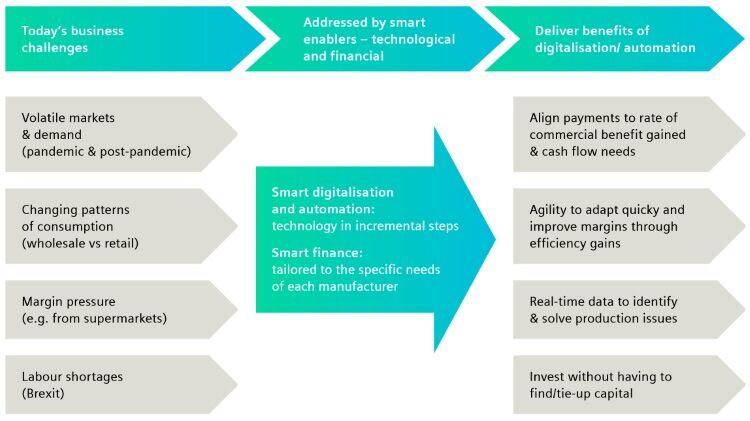The free-to-access paper examines the perfect storm of business pressures faced by baked goods and confectionery industry in Great Britain and Ireland (GB&I), and how pioneers are deploying a combination of technology and smart financing techniques to stay ahead.
The pandemic and its aftermath have caused various forms of disruption, changing product volume demands, unsettling routes to market, affecting margins and forcing a new balance between trade and retail customers. In the UK&I, Brexit-driven labour shortages have only exacerbated the situation.
State of affairs
The ability to rapidly pivot operations – a critical business criteria the world over – has taken on a new importance, driving the demand for digital and automated technology. In fact, recent research from Siemens revealed that 81% of producers are exploring new ways to capture more data on their operations.
On the other hand, the paper accedes the tough post-pandemic financial pressures, which is causing hesitancy among producers. No manufacturer wants to commit large amounts of capital up-front to new tech investments, however beneficial.
This has created a watershed moment for manufacturers to either invest in the technological future or fall behind competitive.
“This paper outlines some of the smart financing techniques that are being deployed by forward-thinking players to keep investment going without encountering a cash-flow crisis,” said Carolyn Newsham, digital industries financing partner, Siemens Financial Services GB&I.
Digital thread
Keith Thornhill, head of F&B, Siemens GB&I, added, “Our research shows there is huge potential for improved process efficiency in the industry, delivering serious uplift to commercial margins. Modernisation and digital process control can transform productivity.
“Yet at the same time, the pandemic experience has undermined investment confidence – an understandable state of affairs. That’s why a holistic look at affordable ways of investing, embracing both technology and financing techniques, is so critical.”

The holistic approach – called the ‘digital thread’ (along with virtual modelling enabled by a ‘digital twin14’) – is instrumental in enabling staged, rapid improvements, production cost reductions, remote maintenance and automated regulatory compliance reporting.
With this digital thread, a manufacturer can check that each improvement area will go to plan before any resources are used in the real world. A digital twin can also act as an operator training function, as well as a virtual commissioning tool for the real hardware installation.
Smart solutions providers will not only use their experience to offer technological stages of investment in automation and digitalisation; they will also offer smart financing techniques that spread those investments over a period to suit the manufacturer’s cash flow.




